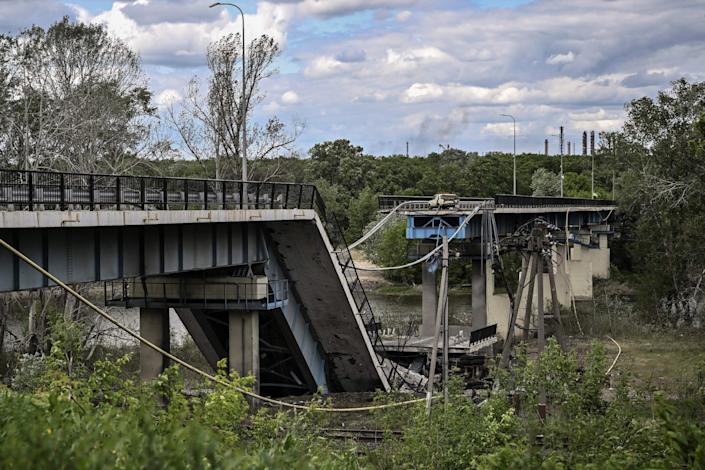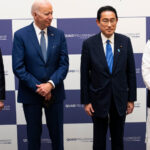Exactly three months since Russian President Vladimir Putin launched his invasion of Ukraine, his forces are pushing to encircle two key eastern cities in an assault that could define this phase of a war President Joe Biden says marks “a dark hour” for the world.
Here’s what to know today on Ukraine, from the fight for the Donbas to the Quad summit in Tokyo.
1) Russian forces advance in bid to encircle Ukrainian troops in two key eastern cities
Russia pushed ahead with its eastern offensive Tuesday, intensifying an effort to encircle two key cities in the Donbas region.
According to both the Ukrainian military and Serhiy Haidai, the governor of the region’s Luhansk province, the Russians were focusing their efforts on surrounding Lysychansk and Severodonetsk.
If successful, the operation would cut off Ukrainian troops in the twin cities, which sit on either side of the strategic Siversky Donets River, from the rest of the country.


Despite strong Ukrainian resistance, Russia has increased the intensity of its operations in the Donbas, the British defense ministry said in its daily update. Its operations to encircle Severodonetsk made minor gains in the past 24 hours, according to the Institute for the Study of War, a U.S.-based military think tank.
Ukrainian President Volodymyr Zelenskyy warned of difficult weeks ahead for the region in his daily address late Monday, accusing Russia of “trying to destroy everything living” there.
2) Biden says world facing ‘a dark hour in our shared history’
The world is navigating a “dark hour in our shared history,” President Joe Biden said Tuesday while meeting with fellow leaders of the Indo-Pacific security grouping known as the Quad.
“This is more than just a European issue. It’s a global issue,” Biden said, urging leaders to embrace a shared responsibility to counter Russian aggression.
“The world has to deal with it, and we are,” the president added.
The Quad, made up of the U.S., Australia, India and Japan, is seen as an effort to counter China. But the Ukraine war also hung over the summit in Tokyo, with Japanese Prime Minister Fumio Kishida saying that Russia’s invasion “shakes the foundation of international order,” according to Reuters.
India is the only Quad member that has not clearly condemned Russia’s actions in Ukraine, as it tries to balance its relations with Washington and Moscow, one of its most important arms suppliers.
3) Russia moves to deepen ties with China amid Western isolation
While the U.S. met with allies in the region to counter Beijing and rally support against Moscow, both Japan and South Korea said they scrambled jets Tuesday as Russian and Chinese warplanes flew in tandem around the area. The Chinese defense ministry later said its air force was conducting “routine joint air patrols” with Russia over the Sea of Japan, the East China Sea and the western Pacific Ocean.
It was just the latest sign of the emerging camps in global affairs, with the Kremlin saying Monday that it will focus on deepening its ties with China after accusing the West of turning its back.
“Now that the West has taken a ‘dictator’s position,’ our economic ties with China will grow even faster,” Russian Foreign Minister Sergei Lavrov said, speaking at a question-and-answer event in Moscow.
Russia and China share a long border, he said according to a transcript on Russia’s foreign ministry’s website, as well as common interests in “upholding the principles of justice and multipolarity in international affairs.”
From now on, Russia will rely “only on ourselves and on those countries that have proven their reliability and that do not ‘dance to someone else’s tune,’” Lavrov said.
4) More high-tech weapons coming to Ukraine, Pentagon says
Some 20 countries have announced new security assistance for Ukraine, Defense Secretary Lloyd Austin said Monday, including more high-tech weapons that Ukraine has been pleading for.
“We’ve gained a sharper, shared sense of Ukraine’s priority requirements and the situation on the battlefield,” Austin told reporters after a virtual meeting with more than 40 foreign ministers and chiefs of defense.
Many countries are donating critically needed artillery ammunition, coastal defense systems, tanks and other armored vehicles, Austin said, while others have come forward with new commitments for training Ukrainian troops.
Austin said that Denmark, in particular, announced that it will send a harpoon launcher and missiles to help Ukraine defend its coast while the Czech Republic recently donated attack helicopters, tanks and rocket systems. Meanwhile, Italy, Greece, Norway and Poland were among the countries that announced new donations of critically needed artillery systems and ammunition, he said.
5) The face of a Russian diplomat ‘ashamed’ of his country


“[He] is no longer with us, rather he is against us.” That was the Kremlin’s reaction Tuesday to the resignation of a Russian diplomat over Moscow’s invasion of Ukraine a day earlier.
Boris Bondarev, a counselor in Russia’s mission to the U.N. office in Geneva since 2019, quit in an email Monday, saying he had never been “so ashamed” of his country as on Feb. 24, the day the invasion began. Bondarev called the war unleashed by Putin “a crime against the Ukrainian people but also, perhaps, the most serious crime against the people of Russia.”
His statement represented the sharpest public break from the Kremlin by a Russian diplomat or other government official since the start of the war.
On Tuesday, Kremlin spokesman Dmitry Peskov told reporters in a phone briefing that he was not familiar with Bondarev’s statement, but said the diplomat’s position went against the “consolidated opinion of our country.” The Kremlin insists that the majority of Russians support its military operation in Ukraine.




